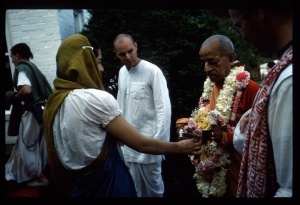BG 15.16 (1972)

A.C. Bhaktivedanta Swami Prabhupada
TEXT 16
- द्वाविमौ पुरुषौ लोके क्षरश्चाक्षर एव च ।
- क्षरः सर्वाणि भूतानि कूटस्थोऽक्षर उच्यते ॥१६॥
- dvāv imau puruṣau loke
- kṣaraś cākṣara eva ca
- kṣaraḥ sarvāṇi bhūtāni
- kūṭa-stho 'kṣara ucyate
SYNONYMS
dvau—two; imau—in this (world); puruṣau—living entities; loke—in the world; kṣaraḥ—fallible; ca—and; akṣaraḥ—infallible; eva—certainly; ca—and; kṣaraḥ—the fallible; sarvāṇi—all; bhūtāni—living entities; kūṭasthaḥ—in oneness; akṣaraḥ—infallible; ucyate—is said.
TRANSLATION
There are two classes of beings, the fallible and the infallible. In the material world every entity is fallible, and in the spiritual world every entity is called infallible.
PURPORT
As already explained, the Lord in His incarnation as Vyāsadeva compiled the Vedānta-sutra. Here the Lord is giving, in summary, the contents of the Vedānta-sūtra: He says that the living entities, who are innumerable, can be divided into two classes—the fallible and the infallible. The living entities are eternally separated parts and parcels of the Supreme Personality of Godhead. When they are in contact with the material world, they are called jīva-bhūtāḥ, and the Sanskrit words given here, sarvāṇi bhūtāni mean that they are fallible. Those who are in oneness with the Supreme Personality of Godhead, however, are called infallible. Oneness does not mean that they have no individuality, but that there is no disunity. They are all agreeable to the purpose of the creation. Of course, in the spiritual world, there is no such thing as creation, but since the Supreme Personality of Godhead has stated in the Vedānta-sūtra that He is the source of all emanations, that conception is explained.
According to the statement of the Supreme Personality of Godhead, Lord Kṛṣṇa, there are two classes of men. The Vedas give evidence of this, so there is no doubt about it. The living entities, who are struggling in this world with the mind and five senses, have their material bodies which are changing as long as the living entities are conditioned. One's body changes due to contact with matter; matter is changing, so the living entity appears to be changing. But in the spiritual world the body is not made of matter; therefore there is no change. In the material world the living entity undergoes six changes-birth, growth, duration, reproduction, then dwindling and vanishing. These are the changes of the material body. But in the spiritual world the body does not change; there is no old age, there is no birth, there is no death. There all exists in oneness. It is more clearly explained as sarvāṇi bhūtāni: any living entity who has come in contact with matter, beginning from the first created being, Brahmā, down to a small ant, is changing its body; therefore they are all fallible. In the spiritual world, however, they are always liberated in oneness.